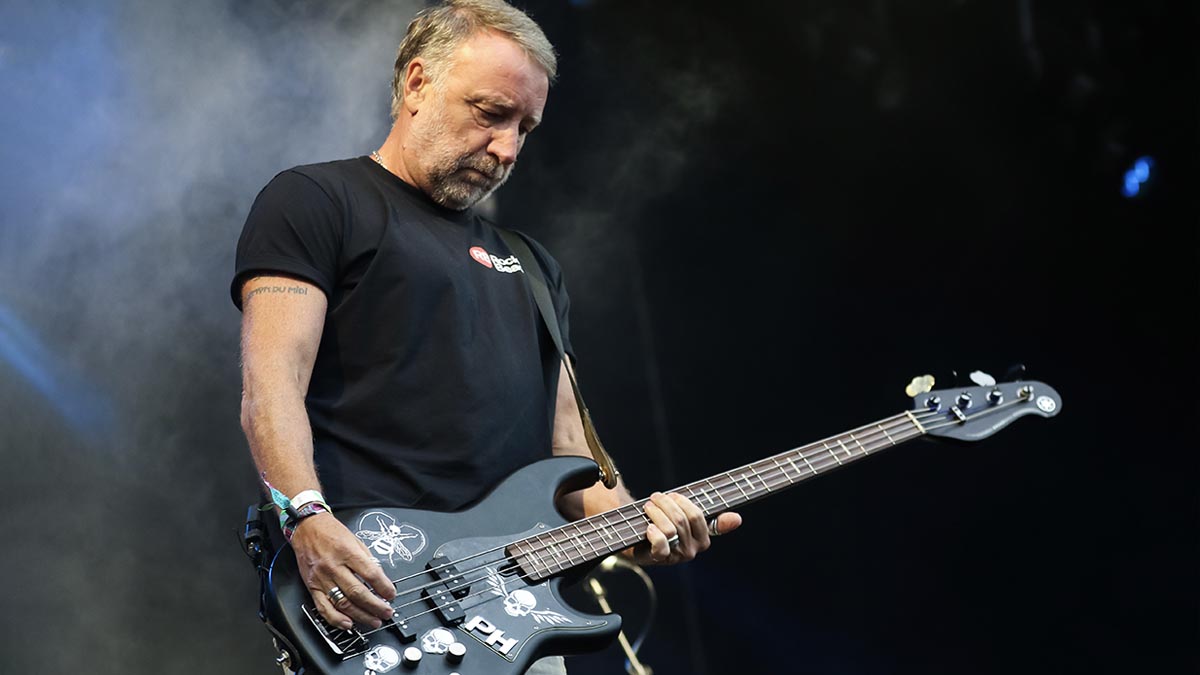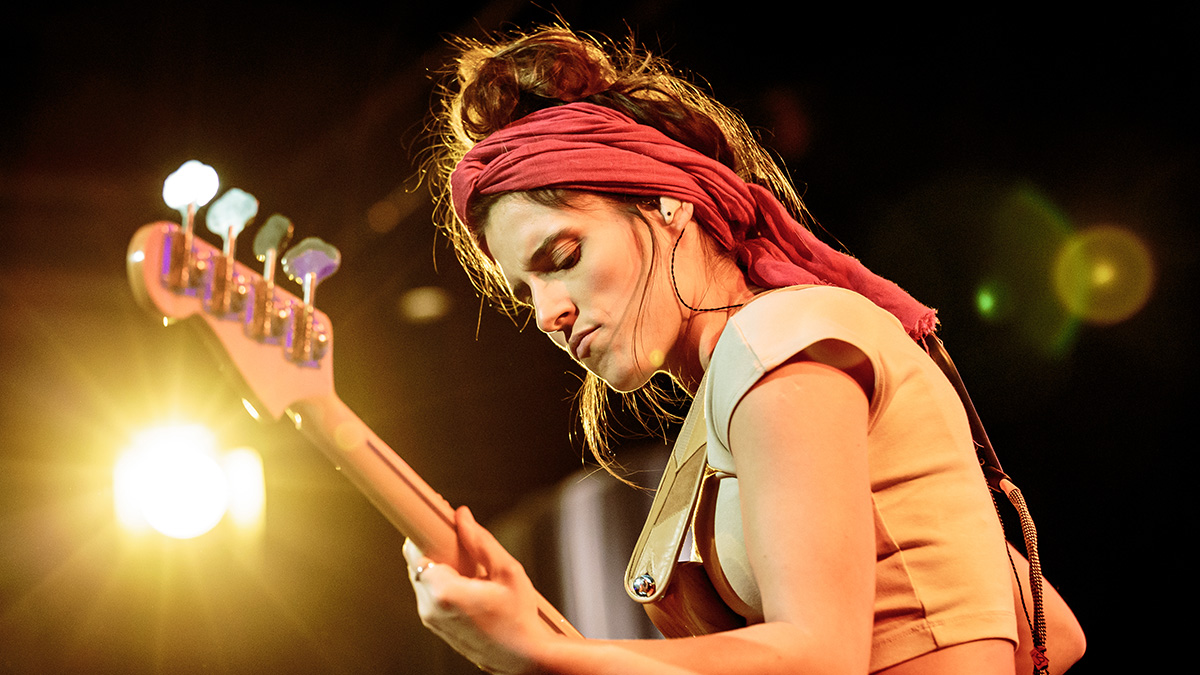Peter Hook on his 5 best bass albums
The Joy Division and New Order co-founder looks back through his back catalog and reflects on the tragedy and triumph of New Order, and the recording of a true survival record

All the latest guitar news, interviews, lessons, reviews, deals and more, direct to your inbox!
You are now subscribed
Your newsletter sign-up was successful
Peter Hook was born Peter Woodhead in 1956, and was the towering talent on the bass guitar behind the seminal bands Joy Division and New Order, as well as projects including Monaco, and the short-lived three-bassist group, Freebass.
Famed for his melodic, often high-register bass-lines, Hooky’s current project is Peter Hook & The Light, in which he plays bass and sings alongside his long-time collaborator David Potts and his own son, Jack Bates.
Hooky’s long career has been one of peaks and troughs, with the music’s success both in terms of sales and quality occasionally hindered by record company shenanigans, poor decisions, and sheer bad luck.
Without Ian Curtis, in no way did we feel like Joy Division. We couldn’t have pretended otherwise
His Rochdale studio in the late '80s played host to most of the upcoming Madchester bands, from the Stone Roses to the Happy Mondays, all of whom he says blagged cheap studio time and then, once they made it, “fucked off to London, Switzerland, fucking Berlin, after breaking my speakers and turning my engineer into a drug addict”, as he puts it.
The legendary bassist, who has chronicled his life over three essential volumes of autobiography, sat down with Bass Player and talked us through five albums that have marked key points over the years.
1) New Order – Power, Corruption & Lies (1983)
“This was a very interesting marriage of new technology, new sounds and old sounds. Ian Curtis’ suicide had taken us to a dark place, and really weighed heavily on us through Movement, which was like a Joy Division album with New Order vocals. Power, Corruption & Lies is full New Order; there’s a different feel, a brightness coming through.
“It’d been very painful, and we were grieving. We were scared about being something we weren’t, and without Ian Curtis, in no way did we feel like Joy Division. We couldn’t have pretended otherwise. There is a pureness that’s lost by not having the correct line-up.
All the latest guitar news, interviews, lessons, reviews, deals and more, direct to your inbox!
“Keith Richards admitted that without Brian Jones it wasn’t the Rolling Stones, and now without Charlie Watts it isn’t either, but they carry on, so it depends on your outlook. This album was New Order finding our feet, and we were definitely nearing the goal on it; there were a few near-misses, but by Technique they’d all come to fruition, and we were scoring. Power, Corruption & Lies is about us being able to move on, and enjoy what we were doing.”
2) New Order – Substance (1987)
“Substance [by] New Order was a compilation instigated by [Factory label owner] Tony Wilson, because his Jaguar had a CD player and he wanted to be able to play our singles in his car. It was the greatest album we never made. Tracks like Blue Monday, Thieves Like Us, Everything's Gone Green, and Temptation really do sum up the band very well.
“It is celebratory, while the Joy Division Substance has a sort of unfulfilled, melancholic feel to it. The Unknown Pleasures and Closer albums have some magnificent bass riffs; I think they sound more band-like. Now you can only put that down to the loss of Ian, whether it had an unconscious or conscious effect. The melodies are very apparent on the New Order LP, whereas they’re not as melodic as the Joy Division record, where the bass sits more in the songs.
“I think we were still finding our direction here, whereas with the New Order singles I was becoming more confident and relaxed in my own skin, and in
a funny way they feature more bass. We had always left the singles off the albums, as punks, because we thought we were ripping off our fans – but both these albums fulfil the same role, in that if I had to explain either band to anyone, these two LPs would be that education.”
3) New Order – Technique (1989)
“We recorded our albums in London, but as they went on we got in increasingly more trouble, so it was time to go somewhere cooler where we wouldn’t get distracted. It was my idea to go to Ibiza, which sounded chilled, laid‑back, comfortable and beautiful.
Most of Technique was written next to a graveyard in Manchester!
“The studio was utter crap, but I chose not to tell my fellow band members. We ended up discovering San Antonio just as acid house kicked off, and it was absolutely wild and cool. Most of Technique was written next to a graveyard in Manchester!
“The only track we actually wrote in Ibiza was Fine Time, which sticks out like a sore thumb. It sounds more like a Republic track and is a bridge between the two albums. It captured the summer vibe: Hope, relaxation, and taking stock of your life. We didn’t have a great time making Technique; there was a lot of jostling for position.
“We finished it in Peter Gabriel’s studio [Real World] in Box, Wiltshire. Later, I was in Heaton Park, and saw this guy with a massive ghetto-blaster booming out a track and I thought it sounded wonderful. So I ran after him and said, ‘Mate, mate, who is this? It’s fucking fantastic,’ and he looked at me like I was a lunatic and said, ‘It’s one of yours, Hooky. It’s Run from Technique.’ Oh my fucking God!”
4) New Order – Republic (1993)
“I used to be very vocal about Republic being an album to avoid, because we were so disengaged from each other doing it, and I couldn’t listen to it without feeling sick. Then, with Peter Hook & The Light, we’d played all the Joy Division and New Order albums up to Republic, live, and I thought, 'Oh my God, how is this gonna go down?'
“But you know what, I loved it. There was enough of me and the other New Order members in there. We never played it live with New Order, but this rescued it and I was able to finish it off to my taste. Ironically, it was a far bigger-selling album than Technique. People were able to see something that I wouldn’t look at. It encapsulated all the failures of and frustration with the Hacienda [club] and Factory, which we transferred onto ourselves as New Order.
“Once I’d got rid of all that stuff, and had a chance to look at it properly, I realized why the fans loved the album. The Light were looking at me, going, 'You fucking idiot, Hooky,' because they could see the good things in the music, and my son could see them too, but it was just what we’d been through making it [that obscured the results]. New Order hardly play any of the songs from Republic, but we play them live. I’ve got it back.”
5) Monaco – Monaco (2000)
“When I got pissed off with New Order and left, I decided I was going to do something completely different. So with [his first post-New Order band] Revenge
I decided not to play the bass at first, then when I did, did it in a different way.
All great music comes from pain
“Changing styles so abruptly made me more unhappy, though. My collaborator Dave Potts kept saying, 'Why are you writing these songs differently? Write the way you did in New Order, with the bass as the base for the melody.' And, lo and behold, in Monaco, I realized what an idiot I’d been and how you need to stick to what you’re good at. It came at a tough time for me personally, when my first marriage exploded, but as Tony Wilson said about the Hacienda, it made New Order miserable, so we kept making great music.
“All great music comes from pain. This is a true survival record: We were coming back. It was very successful all around the world, but then the record label showed all the [rock] bands the door and just signed boy bands. Then I made the biggest mistake ever, which was fucking going back to New Order.
“That’s the thing about playing cards – you get a few wild cards, some wins, push yourself and lose the lot. You have to know when to fold them... and I’ve never been good at that.”
- Peter Hook and the Light tour the UK in April 2022.
Bass Player is the world’s most comprehensive, trusted and insightful bass publication for passionate bassists and active musicians of all ages. Whatever your ability, BP has the interviews, reviews and lessons that will make you a better bass player. We go behind the scenes with bass manufacturers, ask a stellar crew of bass players for their advice, and bring you insights into pretty much every style of bass playing that exists, from reggae to jazz to metal and beyond. The gear we review ranges from the affordable to the upmarket and we maximise the opportunity to evolve our playing with the best teachers on the planet.

